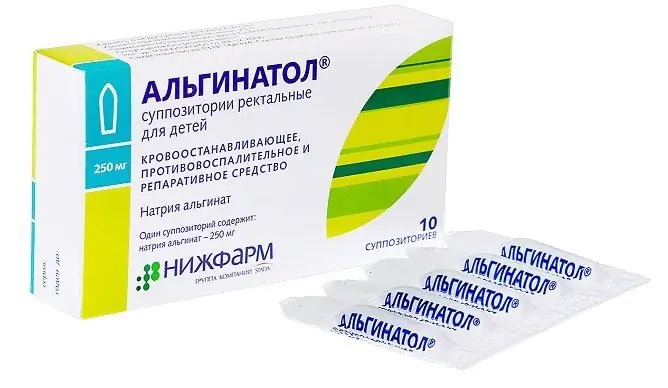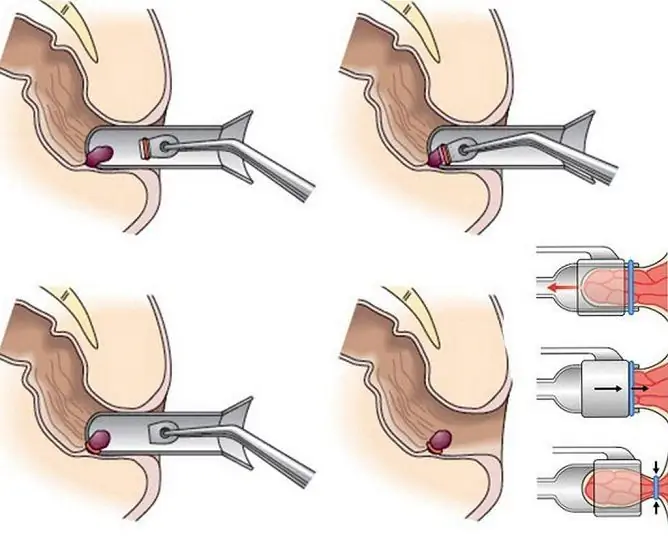- Author Rachel Wainwright wainwright@abchealthonline.com.
- Public 2023-12-15 07:39.
- Last modified 2025-11-02 20:14.
Diet for hemorrhoids

Hemorrhoids is a disease of the large intestine, which is a varicose expansion of the cavernous plexus of vessels located under the mucous membrane and under the skin of the rectum, caused by impaired blood flow in the vessels of the small pelvis and perineum.
A diet for hemorrhoids is a balanced diet that prevents the appearance of the main factors that provoke the development of this disease: constipation, diarrhea.
Constipation and hemorrhoids: causes and consequences of the disease
The causal relationship between constipation and hemorrhoids is extremely difficult to establish. Chronic constipation and hemorrhoids are the most common combination of symptoms that lead a patient to see a doctor. Constipation is one of the main symptoms of hemorrhoids, along with bloody discharge during bowel movements, protrusion of hemorrhoids from the anus, pain, itching, and discomfort in the anus. Often, difficulties in defecation and pain contribute to the development of psychological disorders in patients - fear of going to the toilet. A person in fear of experiencing severe pain is trying in every possible way to suppress the urge to defecate the intestines, thereby aggravating the load on the vessels of the small pelvis and perineum.
Constipation is a violation of the passage of feces in the intestines, which significantly complicates the act of defecation. Constipation can lead to cracks in the rectum, inflammation of the rectal tissue. With constipation, the stool becomes thick and hard. Their accumulation in the lower parts of the rectum squeezes large vessels, thereby disrupting blood flow. Also, with constipation, involuntary tension occurs when trying to have another bowel movement, which has a compressive effect on the vessels of the small pelvis.
The main cause of constipation is malnutrition. The diet for hemorrhoids offers a balanced menu, which will primarily help to avoid constipation, excluding foods that contribute to the thickening of feces, as well as enriching the diet with foods that improve intestinal motility (wave-like contractions of the intestines, which help move its contents to the outlets).
Hemorrhoids and constipation require complex combination therapy. If constipation is left unattended during the treatment of hemorrhoids, then the risk of recurrence of the disease is high.
Diet for hemorrhoids and constipation: a prerequisite for treating the disease
Any disturbances in bowel function lead to disruption of the patient's comfortable life, in some cases lead to complete isolation of the patient from society. Hemorrhoids are accompanied by pain, prolapse of hemorrhoids, bleeding. Constipation can lead to coprostasis (fecal obstruction), and subsequently to fecal incontinence, rectal bleeding, rectal prolapse, intestinal obstruction.
A comprehensive approach is needed in the treatment of hemorrhoids and its underlying cause and symptoms. Currently, there are radical (surgical excision of hemorrhoids) and conservative methods of treating hemorrhoids. One of the main conservative treatment methods is a diet for hemorrhoids and constipation. Many patients underestimate the role of nutrition and regimen in the development of gastrointestinal diseases. Compliance with the principles of a diet for hemorrhoids will prevent the development of the disease, since all age groups are susceptible to hemorrhoids. The disease affects men and women equally. Currently, there is a tendency to "rejuvenate" the disease. Previously, hemorrhoids were considered an age-related and occupational disease. The modern sedentary lifestyle of young people leads to frequent cases of the disease in young people.
A diet for hemorrhoids and constipation will allow to normalize bowel function, activate its peristalsis, as well as develop the correct eating habits in a person, which will further avoid the re-development of hemorrhoids and constipation. No medication can produce the effect that a balanced diet has for hemorrhoids.
Diet for hemorrhoids: the principles of proper nutrition
How does a diet for hemorrhoids avoid the development of hemorrhoids, as well as reduce the manifestation of its symptoms? A properly selected diet for hemorrhoids excludes foods that can increase blood flow to the vessels of the small pelvis, which leads to overflow of veins, protrusion of their walls and the formation of hemorrhoids. Spicy food, seasonings, canned food, spices, pickled foods, and alcoholic beverages have this effect.
The basic principles of a diet for hemorrhoids:
- Eating foods rich in fiber - vegetables, fruits, cereals, bran. Fiber is not absorbed in the intestines, but it performs a number of important functions: it helps to soften feces, reduce cholesterol levels, and removes toxins and toxins. Fiber is a favorable environment for the intestinal microflora, ensuring the full functioning of the intestine;
- Drinking a sufficient amount of water - water helps to soften the feces and their easier movement through the intestines, which avoids straining the abdominal walls, and, accordingly, reduces the pressure on the rectal vessels;
- Compliance with the diet - the body works according to the system. Eating food at a specific time is part of this system. At a certain time, the body begins to produce digestive enzymes, at a certain time an act of defecation (cleansing the body) occurs. Untimely food intake violates the integrity of the system, which leads to malfunctioning of the intestines.

The diet for hemorrhoids offers a balanced diet rich in fiber, fermented milk products that provide intestinal motility. The diet for hemorrhoids also offers a different diet, involving frequent meals up to 6 times a day.
Diet for hemorrhoids: menus and recommendations for compliance
The diet for hemorrhoids, the menu of which is very diverse and offers tasty healthy food, includes the following foods in the diet:
- Dark cereals - pearl barley, oatmeal (groats), buckwheat, barley;
- Wholemeal bread (black, with bran);
- Zucchini, cabbage, broccoli, cucumbers, beets, carrots, raw and stewed;
- Apricots, dried apricots, apples, prunes, bananas;
- Bran up to 75 g per day, which satisfies the body's need for dietary fiber;
- Steamed or boiled meat;
- Vegetable oil (sunflower or olive);
- Fermented milk products (kefirs, yoghurts);
- Juices, fruit drinks.
If you follow a diet for hemorrhoids, the menu excludes or limits the following foods:
- Semolina and rice porridge, as they strengthen the stool, which can provoke constipation;
- Fresh baked goods, white bread, starchy vegetables (potatoes), pasta;
- Turnip, radish, grapes;
- Fried meat, fatty meats;
- Strong tea, coffee, jelly, alcoholic drinks.
Compliance with a diet for hemorrhoids helps to eliminate the food risk factor for the development of the disease, to eliminate its main symptom - constipation. Radical treatments for hemorrhoids do not exclude the need for dieting.
Found a mistake in the text? Select it and press Ctrl + Enter.






